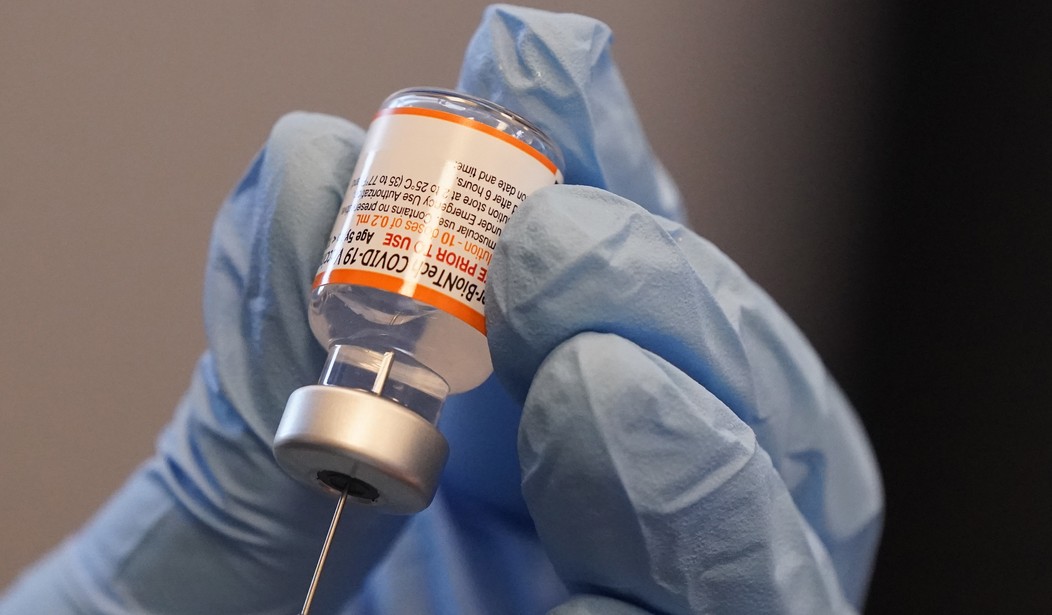During his Sunday appearance on CBS News' "Face the Nation," Pfizer CEO Dr. Albert Bourla told host Margaret Brennan that a fourth shot against the Wuhan coronavirus is "necessary." This is despite Bourla selling the effectiveness of the third shot against the virus.
"Right now, the way that we have seen, it is necessary, a fourth booster right now. The protection that you are getting from the third, it is good enough, actually quite good for hospitalizations and deaths. It's not that good against infections, but doesn't last very long," Dr. Bourla said when asked by Brennan about the necessity of a fourth shot, which would be a second booster. " But we are just submitting those data to the FDA and then we will see what the experts also will say outside Pfizer," he continued to note.
As Brennan pointed out, though, last time Pfizer shared data with the FDA, there was some confusion, as she also asked if such confusion could be avoided in the future.
"I think so. I think so. And I think right now we need to be very well-coordinated, CDC, FDA and the industry so that we are all providing to the American people and to the world a cohesive picture rather than confusion," he offered.
A fourth dose or second booster against #COVID19 is likely to be needed since the protection offered by the current vaccine formulation doesn’t last as long as a new version will says @AlbertBourla $PFE https://t.co/vyNcOtYh4m
— Margaret Brennan (@margbrennan) March 13, 2022
Recommended
Dr. Bourla had also shared such news on Friday with CNBC's "Squawk Box," explaining that they are submitting data to the FDA. "We are making a vaccine that covers omicron and all the other variants," the CEO also shared.
On Sunday, Dr. Bourla also addressed concerns about other variants during the segment. "I think we have done way better than while things could have been done, but clearly we are not where we would all like to be, which is COVID is behind us. I think that right now we have very significant tools in our hands so that we can go gradually, I think, back to our normal lives," he had said. "But we need to understand that the COVID will not go away in the years to come. We will have to live- to learn how to live with it, and we can, as we are living with many- so many other viruses."
Brennan addressed the "learning to live with it" to mean "sort of preparing for what's next." When she asked Dr. Bourla if we will have to get another COVID booster every year, as is the case with the flu shot, Bourla responded with "I think so," adding that "I think this is what we are trying not to make," with he and Brennan continuously referencing Omicron for it being "able to evade in a skillful way, the immune protection that we're giving."
In addition to confusion with the FDA over booster shots before, the FDA has also delayed review of data when it comes to vaccinating children under 5-years old, as Madeline reported last month. Dr. Bourla spoke to that as well, seeking to correct the record in that Pfizer wanted to wait for three doses to come out. Brennan also seemed to advocate for the vaccine being made available for children under 5 before it was ready. "Do you think that having made that vaccine available, it would have saved lives and helped kids stay out of the hospital," she had asked in her remarks.
Brennan continued to push him, and pointed out that the process "was whiplash for parents" and "was very frustrating." She also went on to ask "you don't think that should have happened differently?" Dr. Bourla responded by answering "I think we could have managed it differently, but eventually we are in the right place as to what the situation is."
Data from the CDC points out that, as of March, 49.9 percent of the eligible population have not received the first booster shot yet.
In his State of the Union address earlier this month, President Joe Biden mentioned that "tonight I can say
we are moving forward safely, back to more normal routines," also noting that "COVID-19 need no longer control our lives."
His address came shortly after the CDC updated their guidelines so that 70 percent of the population lives in counties with a "low" or "medium" risk for contracting the virus and thus don't need to wear masks.
Hawaii, as Landon reported last week, announced that indoor masking will no longer be required starting March 26, making them the last state to ease its restrictions. As Katie reported on Thursday, though, the CDC extended the mask mandates for airlines for April 18, 2022. It was set to expire on March 18.

























Join the conversation as a VIP Member